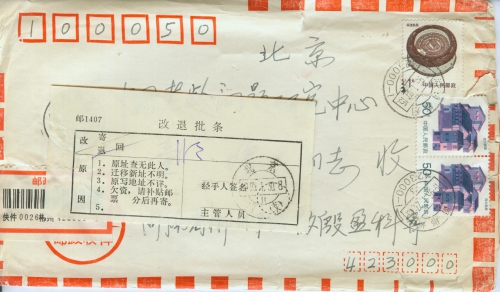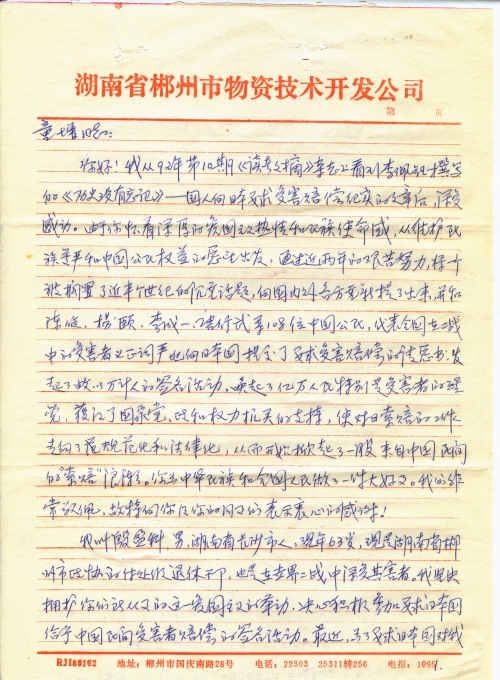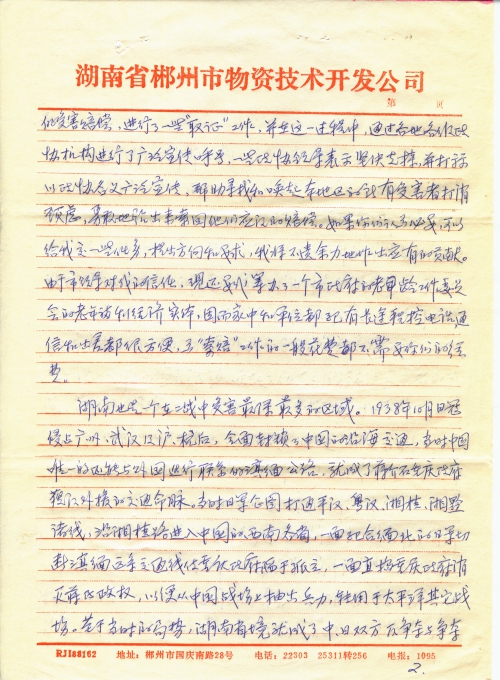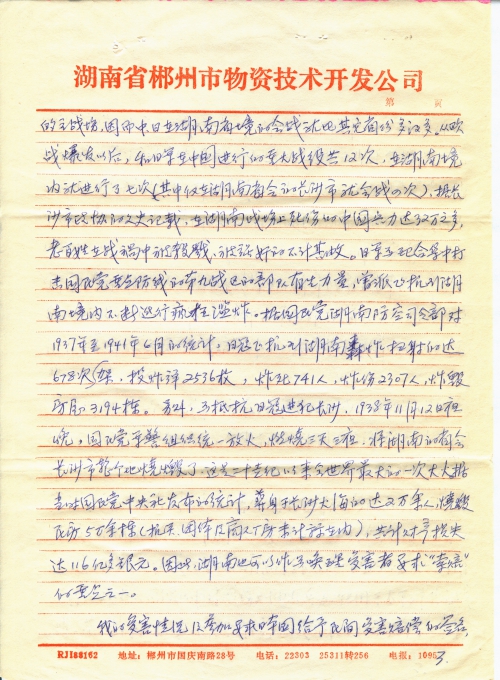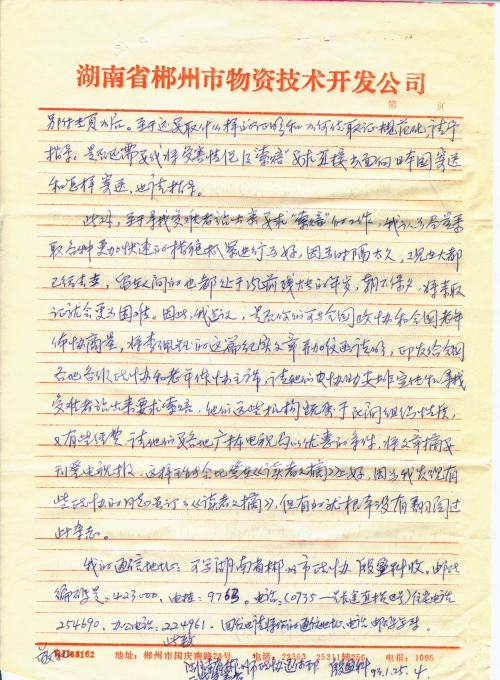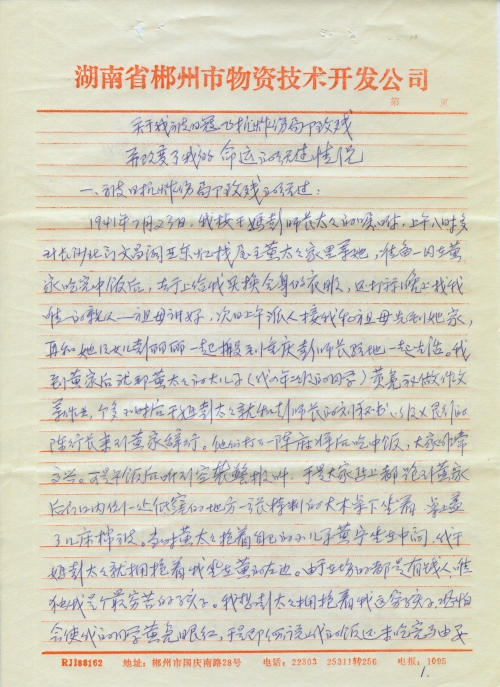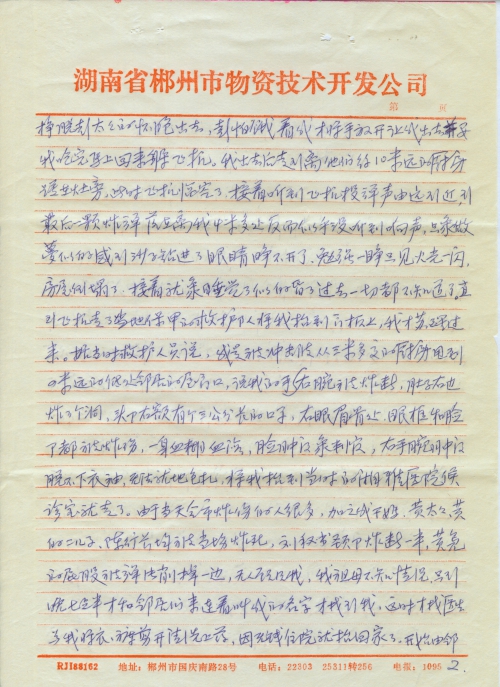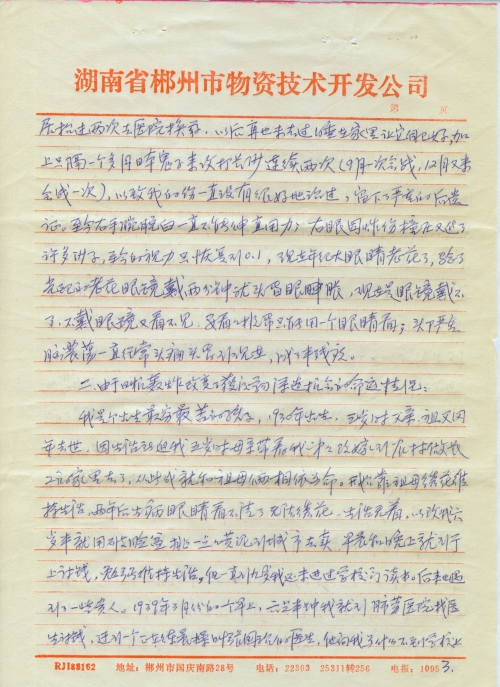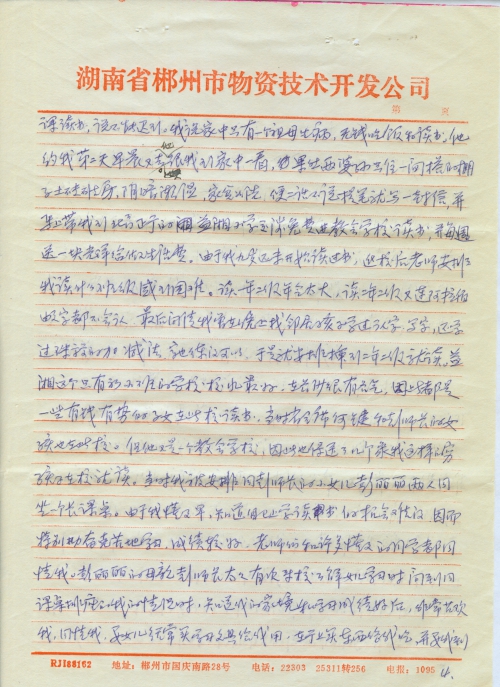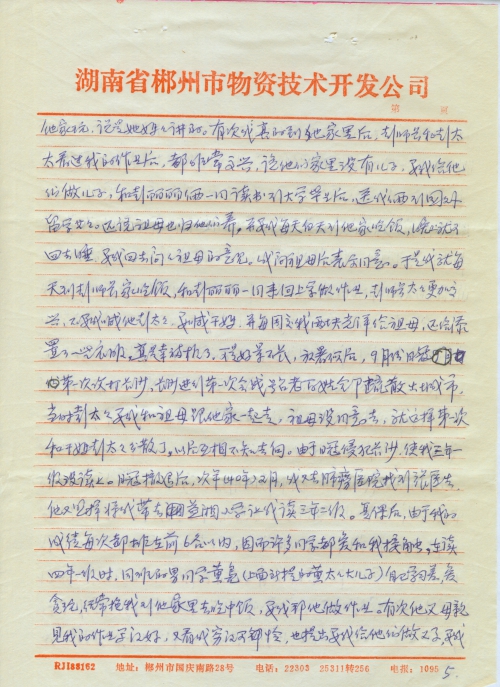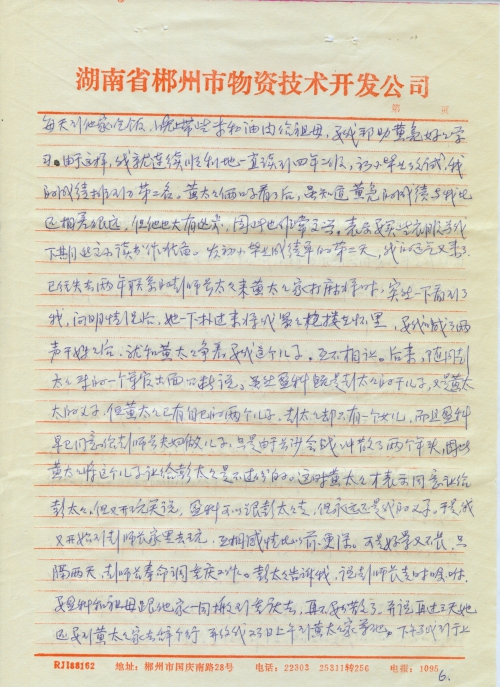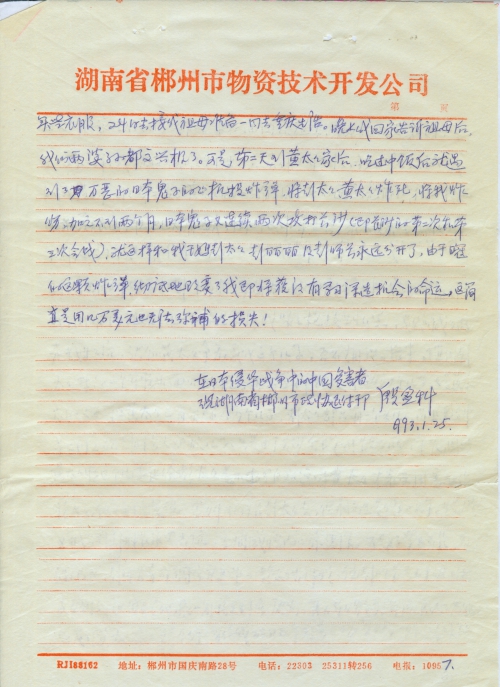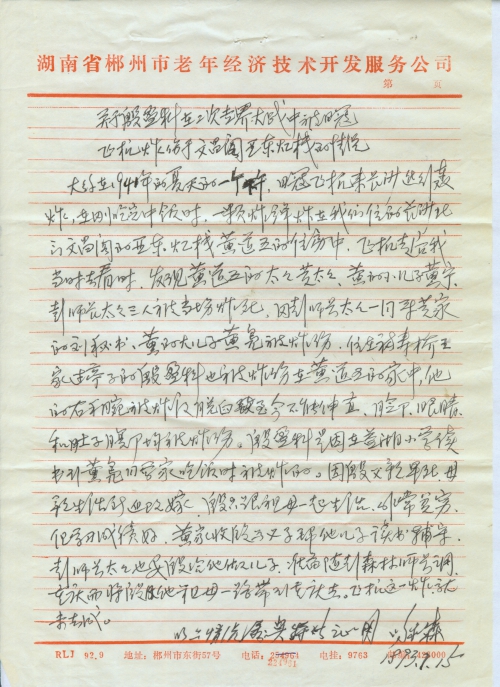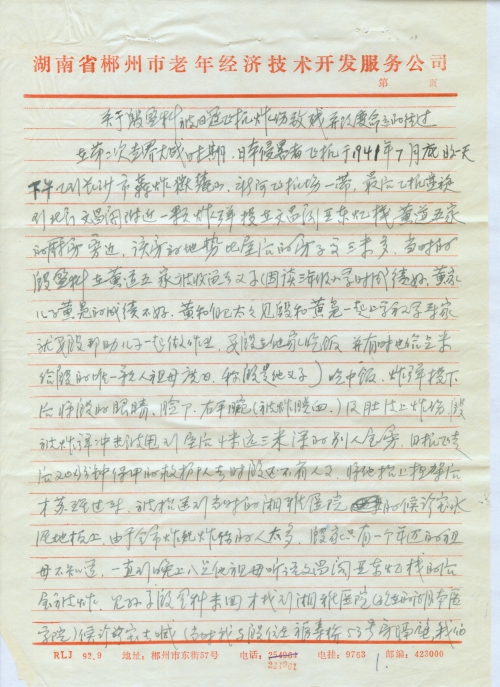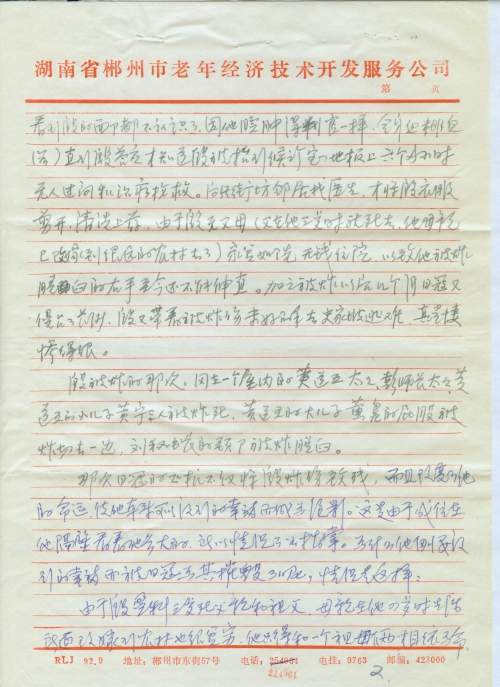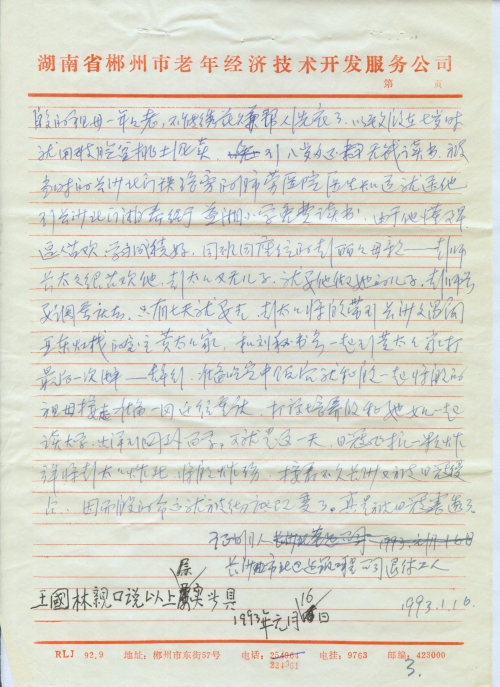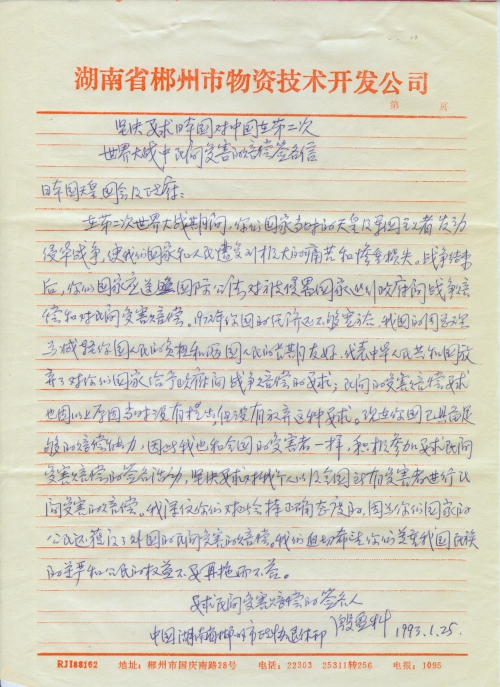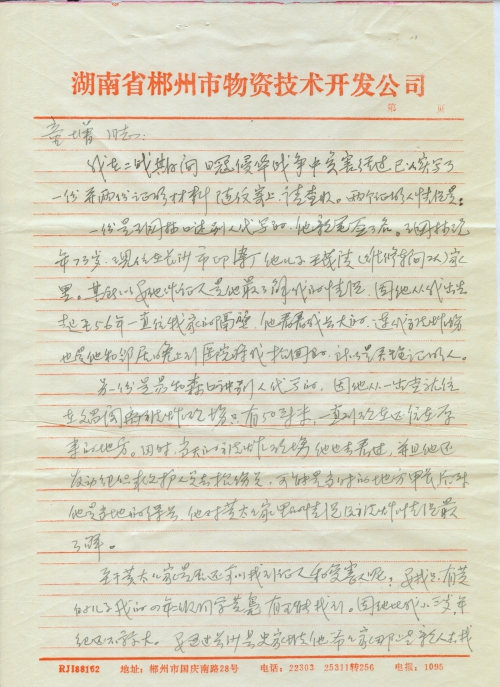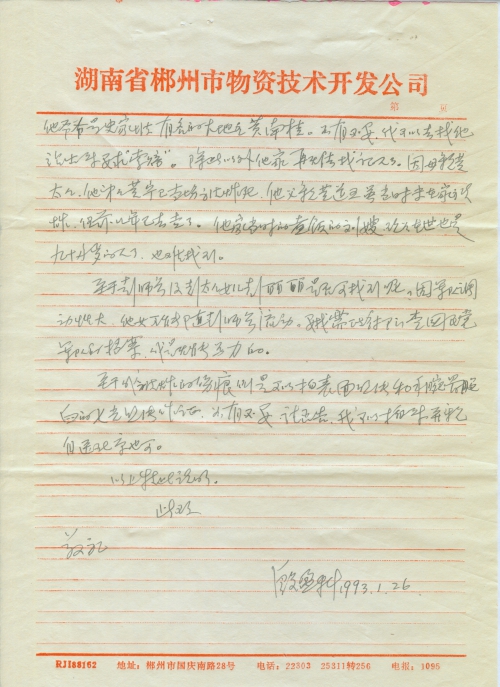Date of letter:1993-01-26
Address of author:Chenzhou City, Hunan Province
Date of event:1941
Location of event:Hunan Province
Name of author:Yin Yingke
Name(s) of victim(s):Yin Yingke
Type of atrocity:Air Bombings (AB)
Other details:I am Yin Yingke, a victim of the World War II. I strongly support your efforts of claiming compensation from Japan. During 1937-1941, the Japanese repeatedly bombarded Hunan Province and I was injured in July, 1941. Enclosed are proof materials.
Comrade Tong Zeng:
How have you been?
I am so touched by the article History Is Not Forgotten– a record of Chinese people demanding compensation against Japan, written by Li Peiyun from Issue 10 Reader’s Digest of 1992. A heavy topic that has been set aside for nearly half a century is being posed to domestic and foreign sides thanks to your deep patriotism, sense of national mission and intention of safeguarding national dignity and interests of Chinese citizens. You, along with other 107 Chinese citizens such as Chen Jian, Yang Yi, Li Chengyi and Tang Xingwu, have filed a petition to Japan demanding compensation on behalf of Chinese victims of the World War II and launched a signature program to evoke the awakening of millions of people, especially the victims. The program has won support of the Party, government and authorities and promoted the work of claiming for compensation against Japan towards standardization and legalization, setting off a wave of claims from Chinese civilians. You have done a great thing for the Chinese people. We admire you very much. I’d like to express sincere gratitude to you and your colleagues.
I am Yin Yingke, male, 63 years old, born in Changsha, Hu’nan. I am a retired (deputy) department-level cadre from the CPPCC of Chenzhou, Hu’nan and also a victim of the World War II. I firmly support your patriotic act and am determined to actively participate in the signature program of demanding compensation against Japan. Recently, I’ve gathered some evidence to demand compensation against Japan and in the process, I’ve extensively publicized your signature program through CPPCCs at all levels. Some CPPCC leaders expressed firm support and intention to help seek and encourage local victims to bravely claim for compensation through expensive publicity. If necessary, you may assign tasks to me and tell me the directions and requirements. I will spare no effort to make due contributions. Thanks to municipal leaders’ trust in me, I’ve been given the task to organize an economic entity for the elderly under the Municipal Government Committee on Aging, so long-distance telephones have been installed at my home and at work. I can conveniently communicate and make business trips. General expenses of the claims work is also provided.
Hu’nan is one of the areas that suffered most during the World War II. In October 1938, the Japanese army blocked traffic in coastal areas after occupying Guangzhou, Wuhan, Shanghai and Hangzhou. At that time, the Yunnan-Burma Road, the only road that connected China to foreign countries, became a transportation lifeline for Chiang’s Chongqing government to get foreign aid. Then, the Japanese army attempted to break through Beijing-Hankou, Guangzhou-Wuchang, Hengyang-Nanning and Hu’nan-Guizhou lines and to march in western and southern provinces along the Hengyang-Nanning road. Apart from cooperating with Japanese army in Northern Burma to isolate the Chongqing government by cutting off the Yunnan-Burma road, they were directly attacking the Chongqing government to wipe out the Chiang Kai-shek regime to transfer the forces from the Japanese battlefield to other Pacific battlefields. Given the then circumstances, Hu’nan Province became a primary battlefield that China and Japan fought for, so more battles took place in Hu’nan than in other provinces. After the outbreak of the wars in Europe, the Japanese army fought 12 major battles with China, 7 of which took place in Hu’nan (4 in Changsha, the capital of Hu’nan). According to the historical records of the CPPCC of Changsha, China suffered 320,000 casualties at Hu’nan battlefields and countless civilians were killed and raped. To attack the effective strength in the ninth division of the Kuomintang Army, the Japanese army once sent planes to heavily bomb Hu’nan. According to the Hunan Aerospace Defense Command of the Kuomintang, 678 Japanese planes were sent to bomb Hu’nan between 1937 and June 1941, dropping 2536 bombs, killing 741 people, injuring 2,307 people and destroying 3,194 houses. Moreover, in order to resist the Japanese invasion of Changsha, the army and police of the Kuomintang Party set fire to Changsha at the night of November 12, 1938. The fire lasted 3 days and nights and destroyed all land in the city. It has been the biggest fire in the whole world in the 20th century. According to the statistics released by the Kuomintang Central News Agency, over 20,000 people were killed in the fire of Changsha and over 50,000 residential houses were burned down (excluding the houses of institutions, organizations and enterprises), causing a property loss of up to 11.6 billion silver Yuan. Therefore, Hu’nan can be regarded as a key city to wake up victims to claim for compensation.
My suffering and signature to participate in demanding compensation against Japan are attached below. Please give me guidance about what evidence is required, how to gain it in a standardized way, whether I need to directly mail my suffering and claim for compensation to Japan and how to mail it.
Additionally, I will take measures to seek other victims to participate in the claims work. Most of the victims have passed away after such a long passage of time and those living victims are at a dying age, making it difficult to acquire evidence in the future. So, I suggest you discuss with the CPPCC and the China National Committee on Aging (CNCA) to publish and spread the documentary article by Li Peiyu among the CPPCCs and CNCAs at all levels and ask these organizations to help publicize and seek the victims. These organizations are private organizations with some funds. They can publish the article in local Broadcast TV News at a favorable discount, which may be better than Reader’s Digest because I find that some of my CPPCC colleagues have subscribed Reader’s Digest, but they never read it.
My mailing address: Yin Yingke, CPPCC of Chenzhou, Hu’nan. Postal code: 423000 Cable address: 9763 Tel: (Direct distance dialing code: 0735). Residential phone: 254690 Office phone: 224 961.
(Please tell me your mailing address, telephone number and postal code in the reply letter.)
Best regards,
Retired cadre from the CPPCC of Chenzhou, Hu’nan
Victim of World War II
Yin Yingke
January 25, 1993
About How I was Partially Disabled by the Japanese Plane Bombing and How My Life was Changed Because of That
1. About how I was partially disabled by the Japanese plane bombing
On July 23, 1941, I went to Mrs. Huang’s house (Yadong Coal Store) at Wenchangge, Changsha to wait for my godmother (the wife of Commander Liu) at her request. We planned to have lunch at Mrs. Huang’s home, then buy clothes for me on the street, pay a visit to my only relative-grandmother in the evening, send someone to take me and my grandmother to her house the next morning and then move with her daughter Peng Lili to Commander Peng’s station in Chongqing to live together. After arriving at Mrs. Huang’s house, I helped her eldest son Huang Fu (my classmate at Class 2 Grade 4) with his homework. A little over one hour later, my godmother Mrs. Peng, Secretary Liu of Commander Peng and Bank Chief Mr. Chen came to Mr. Dong’s to bid a farewell. They played mahjong for a while and then had lunch. We were all very happy. But we heard the air raid alert after lunch, so we hurried to Mrs. Huang’s back gate to site under a big wood desk on a low ground inside the house with multiple layers of quilts placed on the desk. Mrs. Huang sat in the middle, holding her little son Huang Ning in her arms and my godmother Mrs. Peng on her left, holding me. All the people there were very rich, but I was just a poor kid. Fearing that my classmate Huang Fu might be jealous of Mrs. Peng holding me, I tried to escape from Mrs. Peng’s embrace with the excuse of not finishing my lunch. Mrs. Peng let me go because she’s afraid that I might be starved and told me to get back as soon as I finished lunch. I went to the kitchen about 10 meters away from them and squatted beside the stove. Then, the planes could be seen on the sky and I heard the sound of bombing from far to near until the last bomb fell to a place about 4 meters away from me. It seemed that I didn”t hear the bombing this time. I felt sand in my eyes and couldn’t open them as if I was in a dream. I struggled to open my eyes and saw the house collapse. Then, I blacked out. Until the planes left, the local rescue team carried me on a door plate and I came to myself. According to the rescuers, I was thrown away from the over 3-meter kitchen to the neighbor’s door 4 meters way. My left wrist was broken and there were 3 holes in my right belly, a 3cm-long cut on my right forehead. I was also injured in the right eyebrow, eye vertebra and face and covered all in blood. My face and right wrist were swollen so badly that the rescuers couldn’t wrap them on the spot, so they carried me to the then Xiangya Hospital and left. As many people were injured that day, my godmother, Mrs. Huang and her second eldest son and Bank Chief Mr. Chen were killed on the spot, Secretary Liu’s neck was half broken and Huang Fu’s bottom was half cut off, nobody had the time to care about me. It wasn’t until 7:30 p.m. that my grandmother and her neighbors found me by calling my name. They fetched a doctor to clean my wound and put some medicine on it. Then, I was carried home due to the lack of money for hospitalization. At the beginning, I was carried to the hospital by neighbors to change the medicine and after that I just stayed at home to recover by myself. Besides, the Japanese army attacked Changsha twice one month later (one in September and the other in December), so my wound was never properly treated, leaving serious sequelae. Until now, I cannot use much strength with my dislocated right wrist and my eyesight has only recovered to 0.1 due to injury in my right eye. I am old and have to prescription glasses to see things clearly, but I feel dizzy after wearing the glasses for 2 minutes. So, I read newspaper with only one eye. Moreover, I always have a headache due to serious concussion. So, I am half disabled.
2. The Japanese plane bombing took away my opportunity of studying further
I was born a miserable child in 1930. My father and grandfather died in the same year when I was at the age of 3. To make a living, my mother remarried to a worker at the countryside, bringing my younger brother. I was 5 years old at that time. Then, I began to live with my grandmother on our own. At the beginning, my grandmother embroidered to maintain our life, but 2 years later, she couldn’t embroider anymore because she couldn’t see clearly due to illness. We had nothing to live on, so I began to sell mud in the city when I was 6 and a half years old and I begged in the morning and evening to maintain our life. I hadn’t been to school until I was 9 years old. Later, I met some people who gave me unexpected help. At 6:30 a.m. on one morning in March 1939, I went to the Lung Hospital to beg from doctors, where I met a doctor named Zhang Guozhi, who was doing morning exercise. He told me that I should go to school, otherwise I might be late. I told him that I only had a sick grandmother and had no money for food or school. He asked me to meet him there the next morning. The next morning, he went to my house with me and found that my grandmother and I lived in a dark, wet brick house and that we lived in extreme poverty. He wrote a letter on the spot and took me to Yixiang Primary School at Zheng Street. Through negotiation, the Church School admitted me to study for free and would give me a silver coin a week to cover living expenses. As I never went to school before although I was 9 years old, the teacher was puzzled about which grade I should study from. I was too old for grade 1, and I couldn’t read Arabic numbers which were required for grade 2. At last, the teacher learned that I could read and write characters and knew abacus addition and subtraction because I learned from neighbor children, so I was arranged to study at Class 2 Grade 2. At that time, Yixiang Primary School was well-known in Changsha for the best studying atmosphere, so the students were mainly children from rich and powerful families, including the daughters of Provincial Chairman He Jian and Commander Peng. But it was a church school, so it admitted several poor kids like me. At that time, I was arranged to sit on the same bench as Peng Lili, the little daughter of Commander Peng. As I became a sensible child early and knew it was a rare opportunity to go to school, I studied very hard and done well academically. The teachers and many sensible students felt sorry for me. One day When Peng Lili’s mother Mrs. Peng came to the school to learn about the study of her daughter, she got to know about my poor family circumstances and good academic performance. After that, she felt sorry for me and liked me a lot. She often told her daughter to buy stationery products and food for me and invited me to play at her house. One day, I indeed went to their house. Commander Peng and Mrs. Peng were very happy after reviewing my homework and wanted me to be their son because they didn’t have one. They said that they would send Peng Lili and me to study abroad after we graduate from university and would support my grandmother. They wanted me to have meals at their house in the day time and sleep at my own house and asked me to ask my grandmother’s opinion. I did and my grandmother accepted. So, after that, I dined at Commander Peng’s everyday and did homework with Peng Lili after school. Mrs. Peng was happier. She told me to call her godmother and gave me two silver coins every week to give it to my grandmother. She also bought clothes for me. I was so happy, but it didn’t last long. We had a summer vacation. In September, the Japanese army attacked Changsha for the first time and the government called the civilians to leave the city. Mrs. Peng asked me and my grandmother to leave with them, but my grandmother refused, so I got separated from them and lost their whereabouts. I failed to study at grade 3 due to the Japanese army’s invasion in Changsha. In February 1940 after the Japanese army retreated, I went to the Lung Hospital again to find Doctor Zhang. He took me to Yixiang Primary School to study at grade 3. As my academic scores were always ranked the top 6, many students liked to play with me. When I studied at grade 4, my classmate Huang Fu (the son of Mrs. Huang mentioned above), who studied poorly and liked playing, often took me to have lunch at his family and asked me to do homework for him. One time, his mother asked me to be their godson due to my good study and poor family situations and told me to eat at their house in the day time, bring some rice and meat to my grandmother in the evening and help Huang Fu study well. In this way, I studied until graduation from the primary school and my scores were ranked in the second place and Huang Fu also made great progress despite a distance with mine. So, Mrs. and Mr. Huang were very happy and said they would buy me clothes for the next semester. My good luck came the next day after I received the transcripts. Mrs. Peng, with whom I lost contact for 2 years, suddenly saw me when playing mahjong at Mrs. Huang’s. After figuring out the situation, Mrs. Peng hugged me tight and asked me to call her godmother. Then, she fought with Mrs. Huang about having me as a godson. At last, a military officer accompanying Mrs. Peng interrupted, “Yingke is the godson of both Mrs. Peng’s and Mrs. Huang’s, but Mrs. Huang has two sons while Mrs. Peng only has a daughter. Besides, Yingke agreed to be Mrs. Peng’s godson at an earlier time. So it’s reasonable to ask Mrs. Huang to give back Yingke to Mrs. Peng.” So, Mrs. Huang agreed, but joke, “Yingke can go with Mrs. Peng and he is always my godson.” Then, I began to play at Commander Peng’s house and we had a deeper relationship than before. But good days didn’t last. Two days later, Commander Peng was appointed to work in Chongqing. Mrs. Peng told me that Commander Peng wanted me and my grandmother to move to Chongqing with them and asked me to wait for her at Mrs. Huang’s on the morning of 23rd when she would bid a farewell to Mrs. Huang and buy me some clothes. And she planned to take me and my grandmother to Chongqing on 24th. I told my grandmother in the evening and we were so happy. But the evil Japanese army sent planes to bomb us the next day after we had lunch at Mrs. Huang’s, killing Mrs. Peng and Mrs. Huang and injuring me. Besides, the Japanese army attacked Changsha twice (the second and third battles in Changsha) in less than 2 months after that. So I was forever separated from my godmother Mrs. Peng, Peng Lili and Commander Peng. The bomb dropped by the Japanese army completely took away my opportunity of studying further, which cannot be compensated with tens of thousands of dollars.
Chinese victim of Japan’s war of aggression against China
Retired cadre from the CPPCC of Chenzhou, Hu’nan
Yin Yingke
January 25, 1993
About Yin Yingke’s Being Injured at Wenchangge Yadong Coal Store by the Bombing of Japanese Planes during the World War II.
About on one afternoon in the summer of 1941, the Japanese planes bombed Changsha. After I finished lunch, a bomb was dropped at Yadong Coal Store owner Huang Daowu’s house at Wenchangge, Changsha. After the planes left, I went to the scene and saw that Huang Daowu’s wife Mrs. Huang, younger son Huang Ning and Commander Peng’s wife were killed on the spot, and Secretary Liu accompanying Mrs. Peng, Huang’s eldest son Huang Fu as well as Yin Yingke, who lived at Wangjiaguotingzi, Fushouqiao, were injured. Yin Yingke’s right wrist was dislocated and couldn’t stretch straight till today and he was also injured in the face, eyes and belly. Yin Yingke was bombed while having lunch at the house of Huang Fu, his classmate from Yixiang Primary School. Yin’s father died early and his mother remarried to make a living, so Yin lived in poverty with his grandmother. But Yin had a good academic performance, so Mrs. Huang took him as a godson to help tutor her son and Mrs. Peng also wanted Yin to be her godson and planned to take Yin and his grandmother to Chongqing. But the bombing ruined everything.
This is to certify that the above facts are true.
Tang Jiasen
July 15, 1993
About How Yin Yingke was Injured and Disabled by the Japanese Plane Bombing and How His Life was Changed Because of That
During the World War II, a Japanese plane bombed the Xinhe Airport at Yuelushan of Changsha at the end of July 1941. At last, the plane dropped a bomb beside the kitchen of Wenchangge Yadong Coal Store owner Huang Daowu’s house. His house was 3 meters higher than those behind it. At that time, Yin Yingke was taken as a godson by Huang Daowu (Yin studied well at the primary school and Huang’s son Huang Fu didn’t. When seeing Yin and Huang Fu playing at their house, Huang Daowu and his wife asked Yin to help Huang Fu with his homework. They asked Yin to have meals at their house and sometimes gave rice to Yin’s grandmother, his only relative). Yin was having lunch, and the bombing injured his eye, face, right wrist (dislocated) and belly and threw him near a neighbor house about 4 meters away. About 20 minutes later after the plane left, Yin didn’t come to himself until the rescue team carried him on the stretcher. Yin was taken to the cement floor in the waiting room of Xiangya Hospital. As there were so many people being killed and injured that day and Yin’s grandmother, his only relative, didn’t know that he was hurt, Yin was left in the waiting room until 8 p.m. when his grandmother found him by calling his name at Xiangya Hospital (now Hunan Medical College) after hearing that Wenchangge Yadong Coal Store was bombed. Yin (I lived next to them at No. 53, Fushouqiao. But I couldn’t recognize him when I saw him because his face was swollen badly and he was covered in blood) was left on the floor for over 6 hours and nobody gave him medical treatment. Then, the neighbors found a doctor to clean Yin’s wound and put some medicine on it. But Yin had no money for hospitalization because he had no parents (his father died when he was 3 and his mother remarried to the remote countryside). So, his dislocated right arm couldn’t stretch straight until today. Besides, the Japanese army occupied Changsha several months later and Yin escaped to Shijiapo with the injured hand. How tragic!
Besides, during the bombing, Huang Daowu’s wife, Commander Peng’s wife and Huang Daowu’s younger son Huang Ning were killed, Huang Daowu’s elder son Huang Fu’s bottom was cut off by half and Secretary Liu’s neck was dislocated.
The Japanese plane didn’t only injure Yin, but changed his life, ruining his future happiness. I live next to him and watch him grow up, so I know well about him. Why did I say that his future happiness was ruined by the Japanese army? The circumstances are provided below:
As Yin Yingke’s father and grandmother died when he was 3 and his mother remarried to the countryside to live a poor life when he was 4, so he had to live with his grandmother. Yin’s grandmother couldn’t embroider or clean clothes for others due to her age, so Yin had to sell mud from 7 years old and didn’t have money to go to school. When he was 8 years old, a doctor from the Lung Hospital near the railway at the north gate of Changsha took him to Yixiang Primary School at Xiangshou Street to study for free. As Yin knew how to please others and had a good academic performance, his classmate Peng Lili’s mother Mrs. Peng, the wife of Commander Peng liked him a lot. Mrs. Peng didn’t have a son of her own, so he wanted Yin to be his son. As Commander Peng would be transferred to Chongqing in 7 days, Mrs. Peng took Yin to Wenchangge Yadong Coal Store owner Mrs. Huang’s house to play mahjong with Mrs. Huang and Secretary Liu and bid a farewell to Mrs. Huang. Mrs. Peng planned to take Yin and his grandmother to Chongqing after the lunch and would support Yin and her daughter to go to the university and study abroad. But on that day, a Japanese plane dropped a bomb to kill Mrs. Peng and injure Yin. Soon after that, Changsha was occupied by the Japanese army, so Yin’s life was completely changed. He was truly victimized by the Japanese army.
Witness: A retired worker from Changsha North District Engineering Company
January 16, 1993
The above facts provided by Wang Guolin are true.
January 16, 1993
Signature Letter Firmly Demanding Japan to Compensate Chinese Civilian Victims during the World War II
To the Japanese Emperor Congress and Government,
Japanese emperor and militarists launched a war of aggression against China during the World War II, causing great pain and losses to our country and people. After the war is ended, Japan should make war reparations with the invaded countries and compensate civilian victims in accordance with the Public International Law. In 1972, Japan was not economically well-off, so our Prime Minister Zhou gave up the request of war reparations between governments on behalf of the People’s Republic of China to relieve your burden and maintain a long-term friendship between the two peoples. The request of civilian compensation was not proposed at that time due to the same reasons, but it was not given up. Now, your country is capable to make such compensation, so I have actively participated in the signature program like other national victims to firmly demand civilian compensation. We urgently hope that you respect our national dignity and the rights of citizens and that you won’t delay in answering us.
1993.1.25
Signer to demand civilian compensation
Retired cadre from the CPPCC of Chenzhou, Hu’nan, China
Yin Yingke
January 25, 1993
Comrade Tong Zeng,
I’ve sent a copy of my suffering during Japan’s war of aggression against China and two evidence materials. The information about the two witnesses is provided below:
One evidence material was written according to the description by Wang Guolin and signed by him. Wang Guolin is 73 years old and lives with his son Wang Maoqing (a worker of the repair workshop) at Changsha Dyeing Factory. I asked him to be my witness because he knows well about my experience. He lived next to my house from I was born to 1956 and watched me grow up. When I was injured by the bombing, he and other neighbors carried me back from the hospital. So, he is a key witness.
The other evidence material was written according to the description by Tang Hesen because he has lived only 50 meters away from the bombing site at Wenchangge since he was born. Meanwhile, he went to the bombing site that day and organized rescuers to carry the wounded. He might be a local neighborhood officer at that time. He later becomes a local security member, so he knows best about the bombing at Mrs. Huang’s house.
As for witnesses and victims from Mrs. Huang’s family, I may only find Mrs. Huang’s son Huang Fu, my primary school classmate. He is 3 years younger than me, not very old. I can find him through his grandfather at Shijiapo, Changsha. His grandfather is a famous large landowner Huang Nangui at Shijiapo. If necessary, I can find him to demand compensation. Other than him, I could not find other witnesses because his mother Mrs. Huang and younger brother Huang Ning were killed by the bombing on the spot. His father Huang Daowu escaped the bombing because he was then not at home, but died years ago. His family’s cook Mrs. Liu would be more than 90 years old if still alive, so it’s very hard to find her.
As for Commander Peng and his daughter Peng Lili, it’s difficult to find them because the army mobilizes frequently. To find them, I need to check the records of the KMT army, which are surely not available to me.
As for my scars caused by the bombing, I can take a photo of the scars and an X-ray of my dislocated wrist bone as evidence. If necessary, please tell me in the reply letter. Then, I will take the photos and may personally take them to Beijing.
Best regards,
Yin Yingke
January 26, 1993














